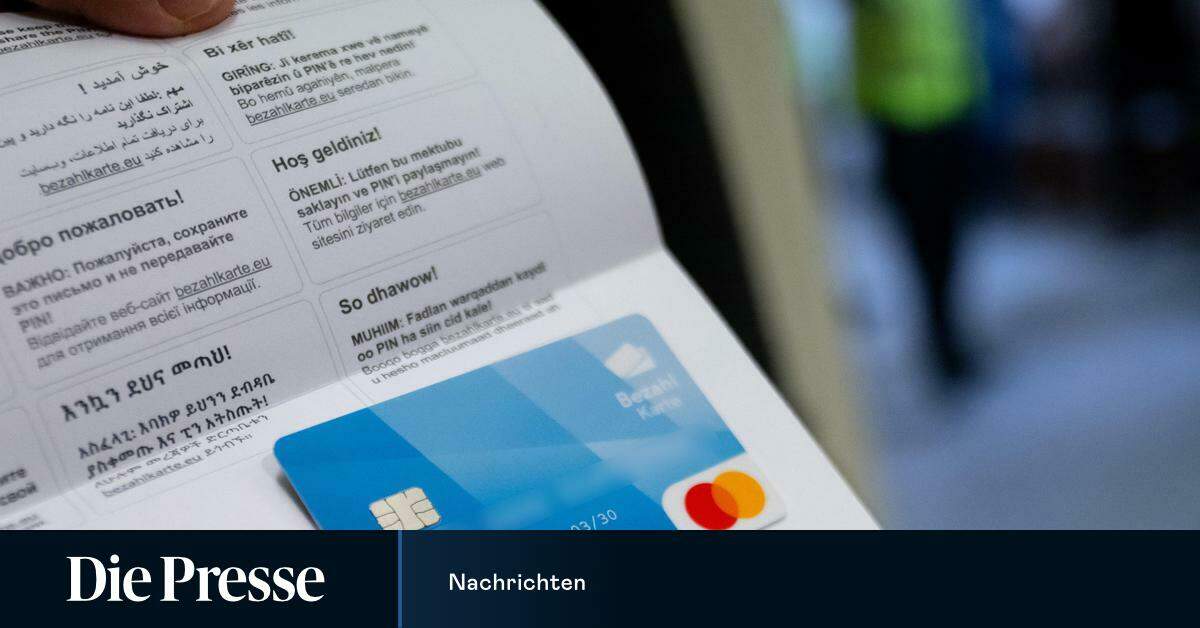By avoiding cash, the German Bundestag wants to prevent, among other things, money transfers to smugglers and the payment of money back home.
The German Bundestag decided, on a unified legal basis across Germany, to introduce a payment card for refugees and asylum seekers. In the future, they should receive part of their living expenses in the country as credit and not in cash anymore. Among other things, this aims to prevent migrants from transferring money to smugglers or family and friends abroad.
Parliament voted in favor of it on Friday in Berlin with a majority vote of the traffic light factions (the Social Democratic Party, the Greens and the Free Democratic Party), and the right-wing opposition Alternative for Germany party also voted in favor of it. The CDU/CSU and the Left as well as the Green MP voted against it.
The authorities should decide how much money can be withdrawn
Federal Chancellor Olaf Scholz (SPD) and the state prime ministers agreed to introduce the card on 6 November. The law now stipulates that service authorities can decide for themselves how much money cardholders can withdraw within a certain period of time. This takes into account “individual needs and local circumstances”.
“The Regulation also allows benefits authorities, in exercising their discretion, to take into account circumstances due to which the use of a payment card does not appear appropriate in individual cases.” This might be the case, for example, if people receive their salaries in their current account.
According to the plans, future asylum seekers in Austria will receive basic services via a benefit card.
Pay for groceries or visit the hairdresser
“The payment card can be used to pay for goods and services in everyday life, as well as groceries in the supermarket, a visit to the hairdresser or a ticket at the machine,” Interior Minister Nancy Visser (SPD) told MPs before the vote. . “However, the possibility of withdrawing cash is limited, taking into account the individual case and local circumstances. The decisive point for us is that cash transfers and payments abroad are no longer possible.
Regulations aimed at facilitating the exchange of data between immigration and social authorities have also been adopted. “We avoid unnecessary effort and complexities that arise, for example, when data on paper has to be recorded digitally again,” said Weiser.
Concern: Those affected should not be pushed into committing the crime
The police union (GdP) warned against keeping the share of cash allocated to refugees too low. Refugees are often pressured to cover their families' medical costs in their country of origin or owe money to smugglers. Sometimes there are stress situations and “the risk that refugees will try to obtain the necessary funds through criminal activities.” Those affected should not be pushed into crime.
The Green Party did not consider uniform regulations across Germany necessary. However, they agree with the regulation that has now been set, as it is now certain that no one will be forced out of society as a result, said the group's vice president Andreas Audretsch.
The CDU hopes for deterrence
Free Democratic Party MP Stefan Thomae confirmed that by using the card, asylum seekers no longer have to wait in line to receive money on the last working day of the month, and they no longer have to take large sums of money with them to shared accommodation.
CDU MP Detlev Sieff explained that the card is not a magic cure, but it could help ensure that fewer asylum seekers move to Germany within Europe. His party colleague Kay Whittaker condemned the project and described it as insufficient because cash payments were not limited to 50 euros per month as requested by the union, and there was no priority for payment cards.
Representatives of the Alternative for Germany party accused the Traffic Light Alliance of having an excessively liberal immigration policy. For his party, the following applies: “Our money is for our citizens, not for the whole world,” explained AfD politician Steven Janic. (APA/DPA)

“Food practitioner. Bacon guru. Infuriatingly humble zombie enthusiast. Total student.”








More Stories
Kyiv: Russian Kursk offensive halted
US Presidential Election: Former US Government Officials Warn Against Donald Trump's Election
Netherlands wants to leave asylum system